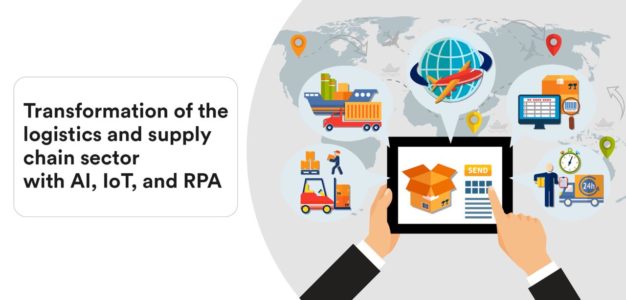“The impact of data-driven and autonomous supply chains provides an opportunity for previously unimaginable levels of optimization.”– SupplyChain
Technologies like Artificial Intelligence is taking a progressively focal role in the logistics industry. As the global logistical demands continue to become more complicated, big-data-driven applications have walked in to streamline logistics on a global scale. The arrival of latest technologies apart from AI like IoT or Internet of Things and Machine Learning has introduced this sector on a path, which is soon going to lead its transformation but also would give rise to a whole new variety of technological paradigms.
Since there has been a lot of discussion about RPA, IoT, and AI, revolutionizing supply chains, it is still unclear as to What are these technologies? How do they work? What kind of problems does each of them solve in logistics and supply chain? And, Why is the coming future of digital supply chains not dependent on these technologies singularly, but only on the combination of all?
Let’s Answer the What’s and How’s–IoT, AI, and RPA are the Future of Logistics and Supply Chain
AI + IoT + RPA through enterprise automation when working together for any organization can function quite autonomously, just like people i.e. making the correct decisions immediately, and at scale. To simplify this, consider IoT or Internet of Things as the eyes and ears of the supply chain which would be responsible for real-time data acquisition and display. In supply chain terms, you can know the location, and at times the condition of goods in the warehouse or transit. In short, IoT provides the capability to understand in real-time what is actually happening remotely.
But what’s the drawback of IoT? It needs an intelligent machine that can learn from the data it receives and handles, make interpretations, and further decide the next plan of action. This is where Artificial Intelligence comes in. Since Artificial Intelligence can “PREDICT”, it would at first analyze previous patterns and normal wait times for the goods at the custom location. Post this, AI uses sensor data in order to draw a relation of the stage it is in, and then seek further instruction from non-sensor sources for example- customs portal.
But, AI is just the mind, it needs limbs to perform real-time action which is where RPA or Robotic Process Automation comes into the picture. Precisely, by definition, RPA is the ability of software or a machine to perform a pre-programmed action repetitively. The power of RPA in the supply chain comes at the time of delivery schedule or automated procurements. Each time the inventory runs flat, the machine then re-orders the goods from the significant supplier.
Apart from this backbone step in the whole automation of supply chain process, RPA can help with scheduling delivery as well. It can automate the delivery schedule with a signified vendor by logging into the vendor’s portal and planning the pickup using OCR or Optical Character Recognition bots.
AI and RPA when work together to automate many functions but without IoT’s assisted sensor data, the combination cannot make informed decisions. Each technology has equal reliance on one another in order to address the supply chain automation system.
This accurately integrated power of three technologies IoT, RPA and AI can help companies in achieving greater optimisation and responsiveness across all logistics, supply chain and transportation footprint.

How Demand delivery will help customers get their goods delivered where and when they require them by using flexible courier services?
AeoLogic, with this acute combination of three constructive technologies, provides an opportunity for its client at different levels of optimisation in, logistics, manufacturing, warehousing and last-mile delivery. Its sequenced services to power the digital enterprises in demand delivery will help consumers or clients get their goods delivered where and when they need them by using flexible courier services. These end-to-end pre-programmed delivery mechanisms provide existential customer experiences through conversational engagement and deliver items before the customer feels the need to order them.
While being the early adopters of this combination (IoT+AI+rPA) of tech in India, AEOlogic also contributes to the technological movement of India further making it a dynamic stakeholder in the innovation frontier.





